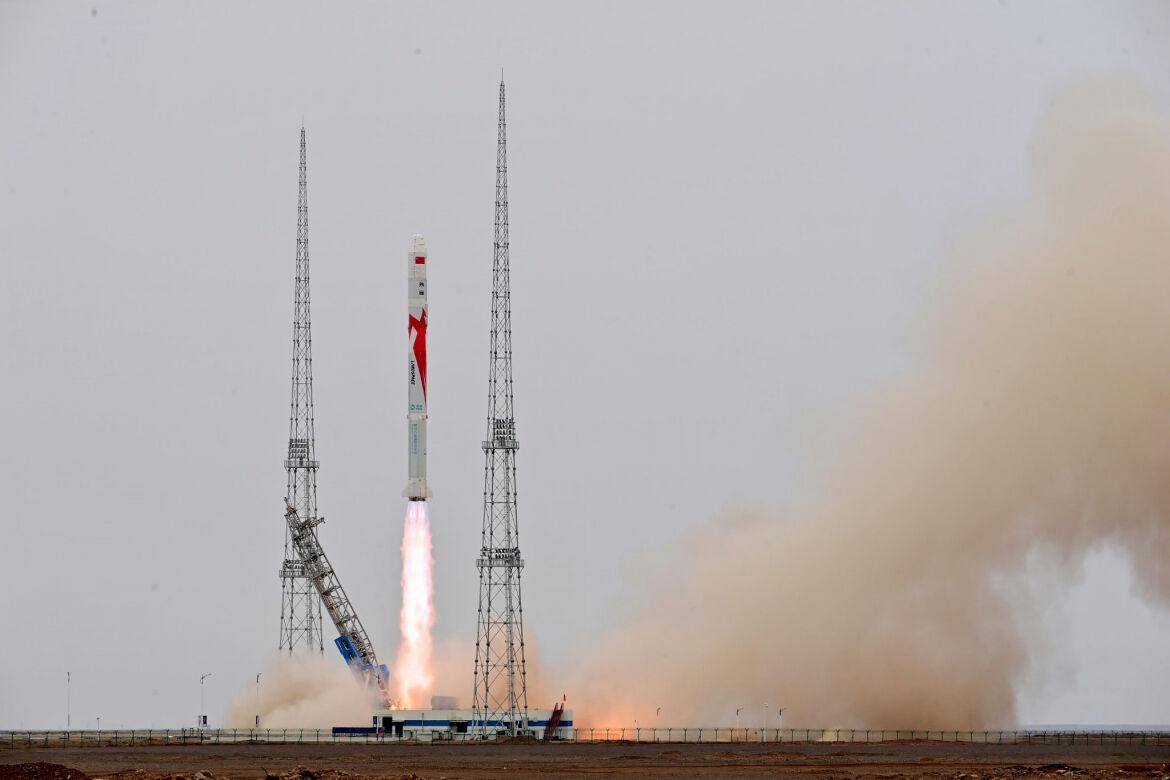In July 2023, Landspace’s methalox-powered Zhuque-2 rocket was successfully launched from the Jiuquan Satellite Launch Centre. This has led to greater interest in feasible methane sources and applications.
In this article, we discuss how the methane derived from cow emissions is a viable source of rocket fuel.

Launch of the first methane-powered rocket by a Chinese enterprise
Source: Western Standard
Environmental Impacts of Conventional Rocket Fuels
Kerosene and liquid hydrogen, the conventional rocket fuels, pose environmental consequences. Burning kerosene causes the release of greenhouse gases like carbon dioxide and nitrogen oxides into the atmosphere, while liquid hydrogen faces volatility and storage challenges.
On the other hand, methane outperforms kerosene and liquid hydrogen as rocket fuel due to greater efficiency and thrust with a higher specific impulse. Its lower volatility ensures safer handling and storage vital for extended space missions while leaving less residue enhancing engine reusability.
Methane capturing from cow farts
Cow farts, or methane gas from cows, is viewed as a safe alternative to kerosene and hydrogen fuel as it reduces emissions, is sustainable, and has a lower environmental impact. Cows produce around 250 to 500 liters of methane per day.
Cows release methane during enteric fermentation, the first stage of the microorganisms-mediated digestion process. The food is broken down in the rumen, a stomach compartment that aids digestion by fermenting and breaking down plant material with specialized bacteria. Methane is produced as a byproduct. Cows burp or fart releasing methane into the atmosphere and contributing to increasing greenhouse gas levels. With a global cow population of over 1.5 billion, their methane production plays a significant role in climate change. As a natural byproduct, methane is renewable and holds the potential for in-situ resource use on other planets. Utilizing methane from cow farts showcases innovative and eco-friendly space exploration solutions.

A natural gas power plant located near a reservoir helps cool its generators, preventing them from overheating.
Cattle-Derived Methane’s Benefits
Abundant and cost-effective, methane is a hydrocarbon that can be easily synthesized on Earth and in space using in-situ resources. Its high-density storage streamlines rocket logistics. Additionally, using this methane reduces emissions, harmonizes with sustainable practices, and lessens the adverse environmental effects of raising cattle.
It provides a readily available and renewable resource as a result of enteric fermentation. Due to its high energy density, it has effective propulsion, which improves rocket performance. Cow-derived methane uniquely gleams in its sustainable and renewable production potential.
Capturing Cow Methane
In a research published in 2006 by the National Academic of Sciences, Engineering, and Medicine, specialized chambers were placed around the cows in order to catch and monitor the gas generated during digestion. Researchers were able to gather methane from cow emissions. Subsequently, gas analyzers were employed to quantify the methane levels within the collected samples. This process offers insights into the viability of utilizing methane as a renewable energy source.
After being collected, the methane was put into airtight cartridges to keep it from escaping into the atmosphere, allowing for further examination and future use as a fuel source.
Monitoring Methane Emissions
The experiment was conducted in controlled environments, on farms or research facilities where cows were monitored for methane emissions. This controlled environment allowed researchers to capture and measure the gas, providing valuable insights into methane emissions and potential applications.

Herd of cows on a farm
Source: Pexels
Specialists have a positive outlook on this technology. They emphasize its importance in reducing environmental effects, investigating renewable energy sources, and promoting sustainable agricultural practices, while difficulties in scale and execution still require thought and continued research.
Methane as a rocket fuel: A Game-Changer in Space Exploration
Methane as rocket fuel could transform space exploration. It is more efficient, safer, and reusable than traditional fuels and could be produced on other planets. This could lead to lower costs and greater accessibility to space.
Recent successful launches by China and SpaceX demonstrate methane’s viability as rocket fuel. Methane-based Raptor engines offer high efficiency, energy density, and in-situ resource utilization, making it a promising contender for future space missions.
When procuring methane from cow farts, we can go a long way in terms of implementing greener and sustainable practices. By efficiently capturing and utilizing this methane, we can significantly reduce greenhouse gas emissions, contribute to cleaner energy sources, and mitigate the environmental impact of cattle farming.
Harnessing methane from cow emissions presents an innovative and eco-friendly solution for rocket fuel. This unconventional yet sustainable source demonstrates the potential for efficient space travel, reduced emissions, and environmentally conscious practices in both space exploration and agriculture.
If you enjoyed reading this post, please subscribe to our newsletter or Visit our Shop to buy some geeky science merchandise.


4 comments
[…] drive for interstellar exploration facilitates longer missions while eliminating the need for extra fuel. Besides, the technology also seems an environmentally friendly option as it produces less waste […]
Your article writing style is really impressive. Great stuff! I bookmarked it and will be sure to check it out later. Nowadays, I find that reading extremely interesting articles or reviews on the internet teaches me something new and difficult.
I blog quite often and I seriously appreciate your information. This great article has really peaked my
interest. I will take a note of your site and keep checking for new details about once per
week. I subscribed to your Feed as well.
[…] the emergence of this new technology, nuclear propulsion has left its indelible mark on many projects and ventures. It has been […]